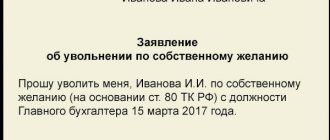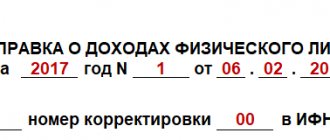Why does an entrepreneur need an accountant?
But really - why? After all, paragraph 2 of Art. 6 of the Law of December 6, 2011 No. 402-FZ “On Accounting” exempts entrepreneurs from the obligation to keep accounts.
Does this mean that an individual entrepreneur may not have an accountant at all? But this exemption is provided only if the individual entrepreneur keeps tax records. And if you calculate taxes yourself, without special knowledge, then it’s easy to make a mistake and “fall” under penalties and other sanctions.
Important!
There are also situations when an entrepreneur is required to keep accounting records. If a businessman had controlled transactions (for example, with interdependent persons), then he is obliged to submit a notification about them to the Federal Tax Service (Article 105.16 of the Tax Code of the Russian Federation). And the source of information for notification will be accounting.
In addition, individual entrepreneurs often conduct accounting voluntarily. After all, tax accounting data may not be enough to manage a business, especially when using special regimes.
When concluding large contracts, as well as when obtaining bank loans, one of the requirements is usually the availability of standard accounting reports.
It turns out that accounting for individual entrepreneurs is still needed in most cases. The only exception may be a situation where the scale of the business is small, and the entrepreneur himself has professional accounting knowledge.
And in this case, he may need advice
When do you need professional help with reporting?
As turnover increases and staff expands, accounting will begin to require more and more time and effort. In addition, no program can take into account all the nuances in the conduct of business of each individual entrepreneur. And you yourself will be responsible for mistakes made when preparing documents for the tax office, and the penalties can be quite large.
In addition, more and more individual entrepreneurs, due to increasing competition, are moving from the simplified taxation system to the general one (OSNO), which is much more difficult to manage and requires special knowledge, skills and abilities. This is facilitated by the fact that many firms choose as partners those entrepreneurs who pay all taxes.
That is why individual entrepreneurs who are on the general taxation system use the services of an accountant to avoid problems with the tax inspectorate. The responsibilities of an accountant for an individual entrepreneur include maintaining all necessary documentation (book of income and expenses, books of purchases and sales, invoices for goods or services, etc.), payment of all necessary taxes (personal income tax, value added tax and other contributions from the salaries of all individual entrepreneurs), preparation and submission of reports to the tax office (VAT, personal income tax) and other extra-budgetary funds (if necessary).
Types of “accounting” violations and responsibility for them
In general, sanctions cannot be applied to individual entrepreneurs for violations in the field of accounting.
Meanwhile, accounting errors still have a negative impact on business. If reports contain unreliable data, or they are generated late, this leads to the adoption of incorrect management decisions.
Also, the absence or distortion of financial statements can lead to the failure of a transaction or refusal of a loan.
As for the sanctions applied by government bodies, for individual entrepreneurs they will be related to tax accounting, i.e. with incorrect calculation of mandatory payments:
- Tax sanctions in the form of fines and penalties are applied to the individual entrepreneur himself, as to the taxpayer (Articles 75, 122 of the Tax Code of the Russian Federation). The fine is 20% or 40% of the amount of the arrears, depending on whether intent is proven. Penalties are calculated based on 1/300 of the refinancing rate of the Central Bank of the Russian Federation per day.
- Administrative sanctions for tax offenses under Art. 15.3 – 15.9 of the Code of Administrative Offenses of the Russian Federation do not apply to individual entrepreneurs (note to Article 15.3 of the Code of Administrative Offenses of the Russian Federation). Therefore, they can be applied to the chief accountant if his direct guilt in violations is proven.
- Criminal punishment for non-payment of taxes and insurance contributions by individual entrepreneurs in large amounts is provided for in Articles 198, 199.1, 199.3 of the Criminal Code of the Russian Federation. Here a fine of up to 500 thousand rubles can be applied. or imprisonment for up to 6 years. Usually the entrepreneur himself is involved. The chief accountant can be punished only if his direct participation in illegal schemes is proven.
Administrative and criminal sanctions are “linked” to the identity of the offender. But tax fines and penalties collected from individual entrepreneurs can sometimes be “transferred” to an accountant. The same applies to losses from failed transactions. Here, a lot depends on the procedure for formalizing the labor relationship between the individual entrepreneur and the chief accountant.
Accountant's responsibility for tax offenses
More details
Job responsibilities of an accountant for primary documentation
The responsibilities of an accountant for primary documentation depend on his area of accounting, and in general, the functions are the following list:
- receiving and checking incoming primary documentation for correctness of completion and compliance with the current legislation of the Russian Federation;
- processing and entering the received primary documentation into a computer program;
- formation on the basis of primary documentation of the corresponding correspondence on the accounts of synthetic and analytical accounting;
- formation of accounting registers in order to summarize incoming primary information;
- development of proposals for the creation of forms of primary documentation based on existing unified forms established by the legislation of the Russian Federation (acts, invoices, etc.);
- participation in the inventory processes of the company's inventory and property, assistance in documenting the results of the audit;
- development of proposals for optimizing the process of processing primary information, as well as accounting operations that an employee encounters in the direct performance of his professional duties;
- generation of reporting information for external and internal users, and especially for the chief or leading accountant or management of the enterprise.
A primary accountant performs duties based on existing theoretical and practical knowledge and skills, which represent a vast area of information.
Accountant economist responsibilities
Full-time or freelance chief accountant: what's the difference?
An accountant can be hired on staff or a civil law agreement (CLA) can be concluded with him for the provision of accounting services. The main differences will be as follows:
- The full-time chief accountant of an individual entrepreneur does not have to comply with the requirements established by clause 4 of Art. 7 of Law No. 402-FZ (education, experience and lack of criminal record). But for a specialist working under the GPD, these requirements are mandatory (Clause 6, Article 7 of Law No. 402-FZ).
- For a full-time employee, wages must be no lower than the minimum wage and paid at least twice a month. The amount and procedure for payment under the GPA can be any by agreement of the parties.
- Personal income tax is paid the same in both options. But you can pay less insurance premiums from payments under the GPA. In this case, contributions to the Social Insurance Fund are not accrued, with the exception of “unfortunate” people, if this is expressly stated in the GAP.
Recommendations for drawing up a job description
Within enterprises of various levels, difficulties often arise with the preparation of job descriptions. Guided by the following simple recommendations for drafting, you can avoid the most common errors during development:
- Be sure to use legislative documents of various levels. In order to develop instructions in accordance with current legislation, it is necessary to involve a third-party lawyer or a lawyer from the enterprise in the development.
- The job description will come into force only after it has been certified and signed by all members of the organization’s management team. On the day of signing, the current date is put on the instructions, and the document becomes valid.
- You should also be guided by the existing instructions of specialists in this area or category - for example, in this case, the job descriptions of other accountants.
- After drafting, the document is read again for natural blots, omissions and omissions. It is good if the editing is done by third parties.
Any candidate for a position must familiarize himself with the current job description. Subsequently, without informing the employee, no changes can be made to the previously proposed job description.
What is the “regular” chief accountant responsible for to the employer?
For a full-time employee, there are the following types of responsibility to the employer:
- Disciplinary under Art. 192 of the Labor Code of the Russian Federation: reprimand, reprimand or dismissal.
- Limited financial liability not exceeding the average monthly income (Article 241 of the Labor Code of the Russian Federation).
- Full financial responsibility. In order for a businessman to be able to compensate for all the damage, one should not limit oneself to the formal signing of standard documents when hiring a chief accountant on staff. An employment contract with an accountant must include:
- a detailed list of his job responsibilities, including accounting, calculation of mandatory payments and preparation of reports;
- condition on full financial liability for damage caused to the business (Article 243 of the Labor Code of the Russian Federation). First of all, we are talking about penalties associated with tax violations. It is also possible to recover from the accountant the costs of restoring accounting if it is proven that violations of the accounting procedure arose through his fault.
Requirements for the position of accountant for primary documentation
The main requirements for the vacancy of an accountant for primary documentation are the following:
- a diploma of higher or secondary specialized education in accounting;
- a diploma of higher or secondary specialized education in economics or finance and a document on retraining courses, as well as work experience of at least 1 year;
- knowledge of the regulatory framework of the Russian Federation;
- practical experience in working with primary documentation, including its reception, verification, processing and entry into a specialized program;
- skills in compiling documents for depositing in the archive;
- perseverance, high concentration and functional performance;
- Computer proficiency level: confident user.
The employer has the right to independently supplement the list of requirements for an accountant based on primary documentation, but must indicate them in his job description.
Civil liability of the chief accountant
If an accountant works according to the GPD, he bears responsibility not within the framework of labor relations, but in accordance with the Civil Code of the Russian Federation.
The important difference here is that according to labor legislation, even with full financial liability, only direct damage is subject to compensation (Article 238 of the Labor Code of the Russian Federation). Within the framework of civil law relations, lost profits may also be recovered from the perpetrator (Article 15 of the Civil Code of the Russian Federation), if the relevant provisions are included in the contract.
You can also file a civil claim for damages against the full-time chief accountant, even after his dismissal. Today, not all businessmen know about this option, but it is quite real. This is evidenced by judicial practice in similar lawsuits filed against general directors of LLCs. The courts in many cases side with the plaintiffs and oblige managers to compensate for the damage caused to the business.
Personal financial responsibility of the CEO to the founders
For obvious reasons, no businessman wants to bring the situation to litigation with his own employees. Unfortunately, there is only one option in which the employer will never sue an accountant - to outsource accounting and tax accounting.
Among the obvious advantages of working with us:
- We, along with our clients, are responsible for the quality of accounting and reporting;
- if an error occurred through our fault that led to financial damage, we will compensate it in full;
- Our professional liability is insured, which is confirmed by the Alfastrakhovanie insurance policy for 70 million rubles, which contains an expanded list of risks.
Of course, people come to us not only with a desire to outsource accounting. Many clients come with problems, for example, with fines already accrued and a lack of understanding of how to resolve the situation. Our specialists have experience challenging sanctions.
Required education to become an accountant
In order to get a job in accounting and become a qualified specialist in your industry, you must, of course, receive the appropriate education.
A candidate for a job must have a financial and economic higher education. They would be much more willing to hire a person who also has a special certificate - an auditor or a professional accountant. But obtaining such a document is not very easy: you will have to listen to a special course of lectures and pass exams.
Graduates of famous universities such as the Plekhanov Russian Academy of Sciences and financial academies will also be highly valued. If a person plans to work in an international company, he will have to obtain a special certificate of IFRS - International Financial Reporting Standards.
A competent specialist should not limit himself to the knowledge acquired during his education at a university. It is highly desirable to understand the legislation and know the principles of working with 1C, Access and Excel programs. Work experience is no less important when applying to any company: work experience must be at least one year.









